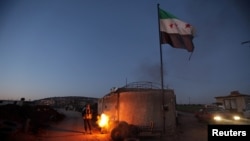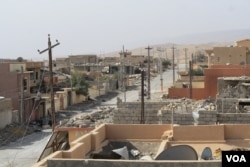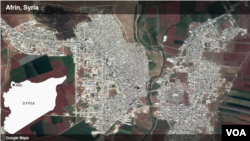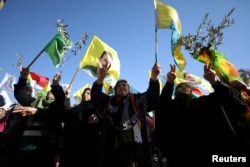As Turkey continues its military offensive and air campaign in Afrin, a city under the control of Syrian Kurds, minorities in the region fear that the conflict could make them a target of hostile militant groups still operating in the region.
“We fear that the factors that contributed to the Sinjar massacre would combine and produce a similar atrocity in Afrin,” Şêkh Ali Reşo, a board member of Central Council of Yazidis in Germany, told VOA.
In 2014, the Islamic State terror group perpetrated genocide against the Yazidis in the Sinjar region of Iraq. Tens of thousands of men, women and children fled to Mount Sinjar, where they were under siege for several days. IS massacred hundreds of them.
The fighting in Afrin has generated fears that religious minorities will again be targeted by extremist groups like IS that still operate in pockets of the region.
“These are not just our fears, but also the fears of Druze [a religious minority], Christians and Mandaens [a religious minority]. Religious minorities are the most vulnerable because they are targeted first and they can’t defend themselves,” Reşo said.
Reşo added that the world must understand that Yazidi fears are legitimate because the Turkish offensive created a very complex situation in the region and the distraction of the offensive could make minorities a target.
“We cannot foresee the future and we don’t know what will happen to our brothers and sisters in Afrin,” Reşo said.
According the Syrian Observatory for Human Rights, a U.K.-based rights group that monitors developments in Syria, IS still has a presence in parts of Aleppo and Idlib provinces. There are also reports that IS still has hideouts in northern Hama.
Members of the Yazidi community in Afrin are concerned about the potential return of IS to parts of Afrin.
IS "was chased out of Manbij, Aleppo, Raqqa and other areas, but they are still around and this operation might bring" them back, Pir Shammo, a Yazidi religious leader in Afrin, told VOA.
Shammo added that his village, Basoufane, a Yazidi village in Afrin, was shelled many times in the past few months by Hay’at Tahrir al-Sham (HTS), an al-Qaida-affiliated terror group, which last year claimed it had severed ties with al-Qaida and operates in the region independently.
There is no official data as to how many Yazidis live in Afrin, but Yazidi and Kurdish sources say there were an estimated 25,000 Yazidis living in Afrin in 2011. In the aftermath of the Syrian war and the subsequent emergence of terror groups, because of fears of persecution, thousands of them left the region and migrated to Europe for asylum.
Diverse city
Afrin is very diverse and home to various ethnic and religious groups. Thousands of refugees poured into the city in 2011 from different parts of Syria, mainly from Aleppo and its countryside, as the Syrian crisis was unfolding.
In 2012, Syrian regime forces withdrew from Afrin and the city fell under the control of Kurdish People’s Protection Units (YPG), the main fighting force in the U.S. backed Syrian Democratic Forces (SDF).
Turkey charges that its offensive in Afrin is justified because it targets the YPG, which Turkey accuses of having ties to the Kurdistan Workers' Party, or PKK, designated as a terrorist organization by the U.S, European Union and Turkey.
However, U.S officials maintain that Turkey’s offensive in Afrin distracts the global coalition against IS from doing the more important work of eliminating the Islamic State terror group in the region.
Civilian casualties
Continued Turkish shelling and airstrikes reportedly killed dozens of civilians in the city since it began this month, sparking criticism and calls for international intervention.
“We are unable to protect ourselves or our families from these attacks. We are also unable to offer a shelter for the innocent people,” a statement issued by the Kurdish Churches in Afrin and Kobane said.
Isa Berekat, a local Kurdish Christian in Afrin and a member of Good Shepherd Church, told VOA that Afrin is full of civilians and they are under attack.
“Christians in Afrin condemn these brutal attacks on the city. Many people were displaced. We call on human rights organizations to help us. Afrin needs aid and we pray to our Lord for protection of all innocent people in Afrin,” Berekat told VOA.
“Kurds, Muslims, Yazidis and others are living in Afrin, we call all human rights organizations to help us,” Berekat said.








